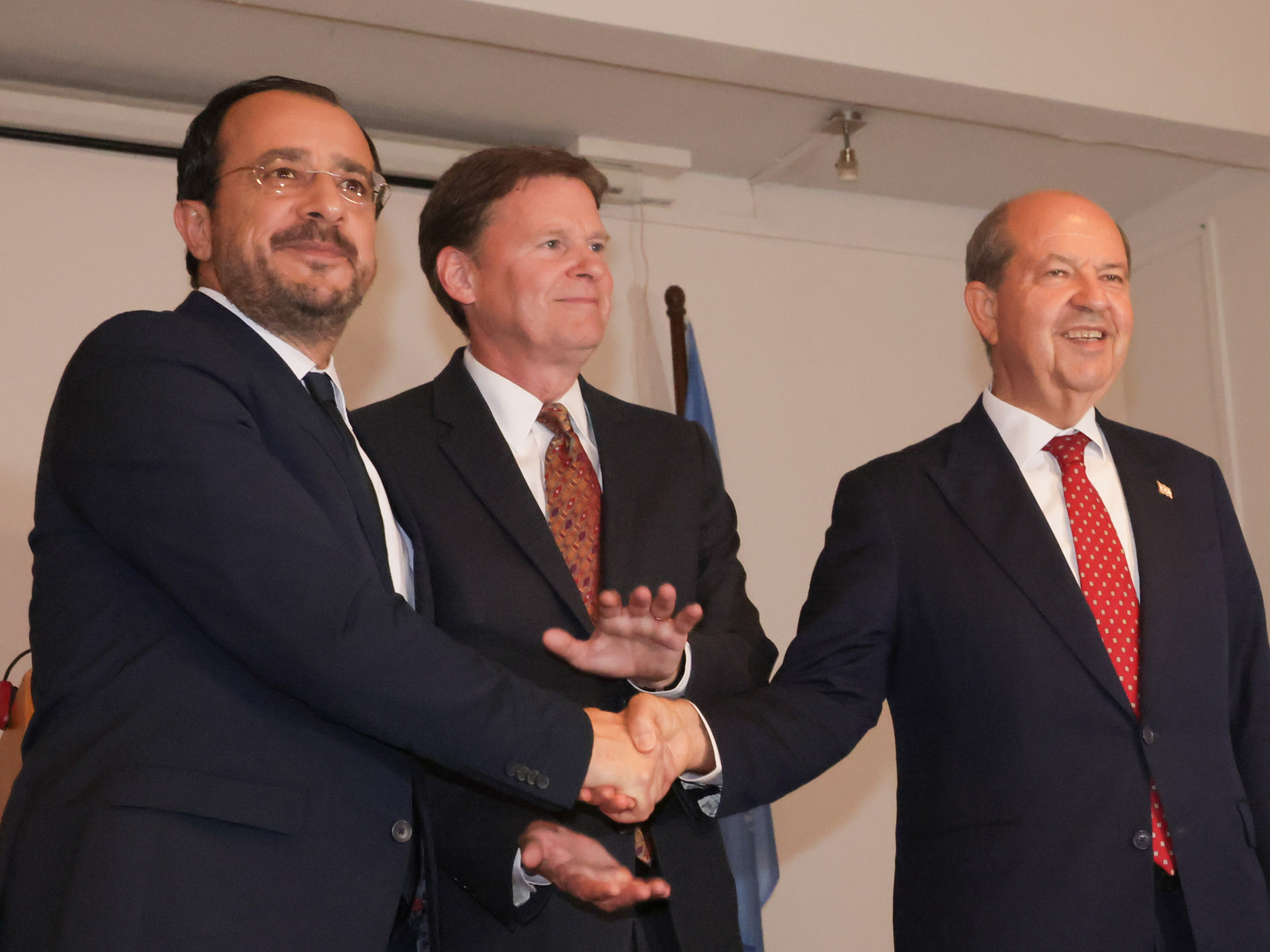The Cyprus problem in 2024 started with a bang or two, then a whimper, then another bang and wimped out again by December, mid-year coming as it did on the 50th anniversaries of the July 1974 coup and Turkish invasion.
Instead of starting the year with a glass half-full, the backdrop to the opening scene was a glass half-empty.
In January 2024, the never-say-die UN, partly influenced by the constant nagging from the Greek Cypriot side for a new envoy, fired up the merry-go-round again albeit in a subdued way.
Still, it was something, the thing we like to call “movement” in Cyprob lingo.
By then we had a shiny new leader on the Greek Cypriot side, President Nikos Christodoulides and Mr Two-States, Ersin Tatar, Turkey’s Turkish Cypriot leader.
UN chief Antonio Guterres, in his January 2024 report, aside from referring to the “sobering anniversary” marking 60 years of UN involvement in Cyprus, spoke of “continued strained hope” that there could be developments “after many years with no substantive negotiations and low public confidence in prospects for a settlement”. Very cheery, Tony.
Guterres said however that it becomes clearer “with every passing year that the divide between the sides is growing, gradually eroding the prospects of finding a mutually acceptable political settlement”.
Despite his stated “disappointment” with the lack of progress, Guterres sent in his angel of mercy Maria Angela Holguin.
She was given an initial six-month mandate to determine prospects of new negotiations and everyone rejoiced. Her first two rounds of contacts took place in late January and March. To no one’s surprise she was, through no fault of hers, unable to bridge any gaps.
The Greek Cypriots want to time travel back to 2017 to pick up from where things stopped in Crans-Montana. The Turkish side says it has moved on, claiming a two-state solution and recognition of the north is now the only way forward. At least in the past both sides had pretended to be on the same page.
Holguin bowed out later in the year but not before writing an open letter where she took stock of her tour of duty in Cyprus. She urged the two sides to think outside the box while also warning of the detrimental effects of negotiations fatigue or dwelling on the past. Cyprob fatigue? Nah.
It was now “important to move away from solutions that in the past have created expectations that were not met and led to greater disagreements and frustrations”, she said.
Her open letter came in July days before she was due to submit a report to Guterres and amid the 50th “black anniversaries”, mourned on the Greek Cypriot side and celebrated in the north with a visit from Turkish President Tayyip Erdogan. No need to repeat what he said.
Guterres also in July, in his mid-year report, again appealed to the two leaders to engage in dialogue to resolve their differences, stressing that only through mutual engagement and trust can progress be made towards a lasting solution.
There was a “growing frustration over the continued status quo across the island”, he said.
Christodoulides addressed the UN General Assembly in September taking a swipe at Erdogan with a sexy soundbite. “International law is not a la carte.”
He framed the Cyprob as not just a national crisis, but “a global one”, where the “very principles of the UN Charter were at stake”. The president’s soundbites are becoming legendary while Tatar’s seem to be coming from a broken record.
Finally, Guterres managed to get the two leaders to sit down in New York in mid-October. Before the informal dinner – because a formal dinner might indicate “progress” – Tatar said no talks “would begin until…”. We all know the rest of that sentence.
The UN chief managed to get him and Christodoulides to agree to informal, naturally, five-party meeting with the three guarantor powers to take place “in the near future”, which in Cyprob terminology is meaningless like all timeframes so it could be months or years. The Cyprus issue is not called “protracted” for nothing.
The leaders also agreed to meet in Cyprus to explore the possibility of opening new crossing points along the buffer zone. Some observers suggested it was the best possible outcome in the circumstances.
“We are not there yet,” the president said when asked about positive developments. Tatar had played his favourite track: “I maintained my positions,” for the UN chief in case Guterres did not know the lyrics by heart already.
Two months later, both the five-party informal and any meeting on the crossings were still up in the air and we all stopped listening again.
It was announced in early December that UN Assistant General Secretary Rosemary DiCarlo, who has taken up Holguin’s baton, would visit Cyprus in the first few months of the new year, to see if she could get things moving.
Déjà vu anyone?
The most the leaders managed in terms of meeting was having a drink at the annual end-of-year reception hosted by the UN Secretary-General’s Special Representative Colin Stewart – so definitely the year ended with a whimper rather than a bang.
But it’s always good to pretend at least to stay positive. The president is. “It appears [the five-party meeting] will be after the end of January, possibly February or March,” he said on December 15.
On the new crossings, Christodoulides said Tatar “agreed to think” about a meeting.
So we have two glasses going into 2025. One’s half full, the other’s half empty, which when it comes to the Cyprob, is essentially the same thing.






Click here to change your cookie preferences